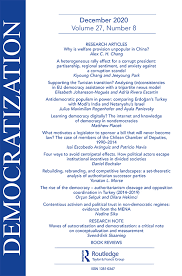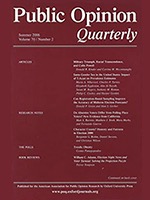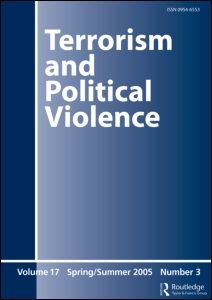Welcome to my website! I am currently affiliated with Radboud University as a Radboud Excellence Fellow. My research focuses on the existing challenges to democracy with a special emphasis on election-related conflicts, political violence, and modern forms of authoritarian rule. In my research, I combine traditional political science topics with computational methods, especially natural language processing (NLP). I am the author of Electoral Violence in the Western Balkans. From Voting to Fighting and Back (Routledge; 2017) and War Narratives in Post-Conflict Societies: Keeping the Past Alive in the Former Yugoslavia (Routledge; 2024). My papers on electoral violence, democratization, and conflicts have been published in a variety of international peer-reviewed journals (e.g. Democratization, Party Politics, Government and Opposition, Terrorism and Political Violence, Studies in Conflict and Terrorism, or Journal of International Relations and Development).
 |
Bias in the eye of beholder? 25 years of election monitoring in Europe in Democratization, 29 (5): 899-917. The article analyses quarter of century of election monitoring in Europe and assesses the congruence of OSCE written assessments with expert views. We show that, overall, the OSCE monitoring reports are highly correlated and congruent with expert assessments. More importantly, we show that OSCE has a strong and positive bias towards Russia and its allies when it comes to election assessments indicating defensive and lenient stances.
|
 |
Voting and Winning: Perceptions of Election Integrity in Consolidating Democracies in Democratization, 28 (8): 1423-1441. How do voters in consolidating democracies see electoral integrity? How does election affect the change in perception of electoral integrity among these voters? What role does winning play in seeing an election as free and fair? Building on the theory of the winner-loser gap, we answer these questions using original two-wave panel surveys we conducted before and after three parliamentary elections in Southeast Europe in 2018 and 2020. The article focuses on changes of perception of electoral integrity as a function of satisfaction with the electoral results in contexts where the quality of elections has always been at the centre of political conflict. |
 |
Contesting war memories: Parties and voters in contemporary Southeast Europe in Party Politics (online first; October 2021).
Using data collected in an expert survey on the policy positions and ideological orientations of all relevant political parties, as well as an extensive survey of more than ten thousand voters in the six post-conflict countries of Southeast Europe, we demonstrate that collective memories of war are not only subjects of historiographical contestation but are also significant sources of ideological and policy differentiation among political parties, as well as one of the strongest determinants of voter choice. Our analysis shows that collective memories are politically contested and that party politics research would benefit from taking them seriously. |
 |
Health versus Wealth during the Covid-19 Pandemic: Saving Lives or Saving the Economy? in Public Opinion Quarterly, 85 (3): 808–835. In this study, we analyze public attitude toward this trade-off using a survey-embedded experiment conducted with a quota sample of more than 7,000 respondents from Southeast Europe, collected in April and May 2020. The results show that public opinion generally favored saving lives even at a steep economic cost. However, the willingness to trade lives for the economy was greater when the heterogeneous health and economic consequences of lockdown policies for the young and the elderly were emphasized. Free-market views also make people more accepting of higher casualties, as do fears that the instituted measures will lead to a permanent expansion of government control over society. |
 |
Talking War: Representation, Veterans and Ideology in Post-War Parliamentary Debates in Government and Opposition, 57 (1): 148-170. How do politicians in post-war societies talk about the past war? How do they discursively represent vulnerable social groups created by the conflict? Does the nature of this representation depend on the politicians’ ideology or their record of combat service? We answer these questions by pairing natural language processing tools and a large corpus of parliamentary debates with an extensive data set of biographical information including detailed records of war service for all members of parliament during two recent terms in Croatia. We demonstrate not only that veteran politicians talk about war differently from their non-veteran counterparts, but also that the sentiment of war-related political discourse is highly dependent on the speaker’s exposure to combat and ideological orientation. These results improve our understanding of the representational role played by combat veterans, as well as of the link between descriptive and substantive representation of vulnerable groups in post-war societies. |
 |
Looking Eastward: Network Analysis of Czech Deputies and their Foreign Policy Groups in Problems of Post-Communism, 66 (6): 418-433. This article analyzes a structure of relations among the members of the Chamber of Deputies, the lower house of the Parliament of the Czech Republic, as reported through their memberships in bilateral and multilateral groups of friendship which establish professional contacts between the Chamber of Deputies and foreign parliaments. We approach the structure as a social network of members of parliament and interpret the memberships as proxy indicators of their interests/preferences in foreign affairs. This research shows that interparliamentary groups construct a self-sustained independent structure for parliamentary diplomacy which may significantly differ from the official positions of the government. We find that the studied network has a centralized core–periphery structure, in which deputies who are less prominent and those interested in authoritarian regimes occupy more central positions. This research connects the findings with the current debates on Central European tendencies to look for allies in large authoritarian regimes (Russia and China), for which we argue the interparliamentary groups might play the role of an important communication channel. |
 |
Fighting and Voting: Mapping Electoral Violence in the Region of Post-Communist Europe in Terrorism and Political Violence, 30 (4): 589-615. Electoral disputes accompanied by violent outbreaks have become an emerging problem in societies under transformation, in authoritarian regimes, as well as in young democracies. The truth is that many politicians elected to office, their supporters, and political activists have altered their perceptions of electoral competition in a form of zero-sum logic with direct consequences for their opponents. After the fall of Communism in the beginning of the 1990s, Central and Eastern Europe stood at a crossroads. This period of imbalance and uncertainty affected the violent interaction in newly reformed electoral arenas with serious consequences for legitimizing democratic change. Despite the well-documented tension that existed in the region, the importance of violence in the electoral arena is rather neglected. The article approaches this gap as the first attempt to map electoral violence in a new typological environment where the process of transformation has affected political pluralism and the patterns of political contest. It argues that electoral violence is not a rare phenomenon in the region of post-Communist Europe and the dynamic varies on a great scale. Moreover, the article presents a picture of electoral violence occurring in different settings with potentially different contextual preconditions that need to be studied separately. |